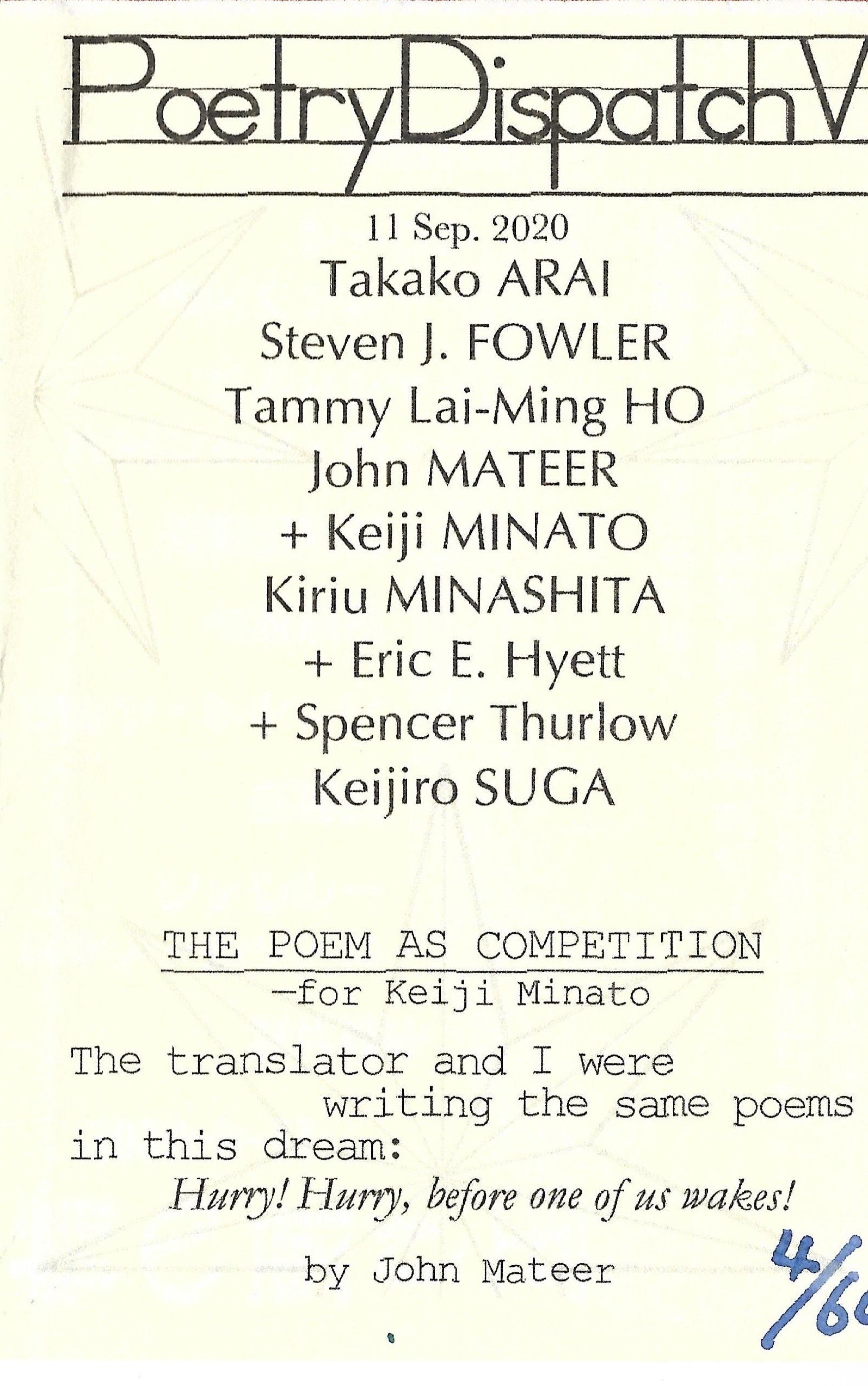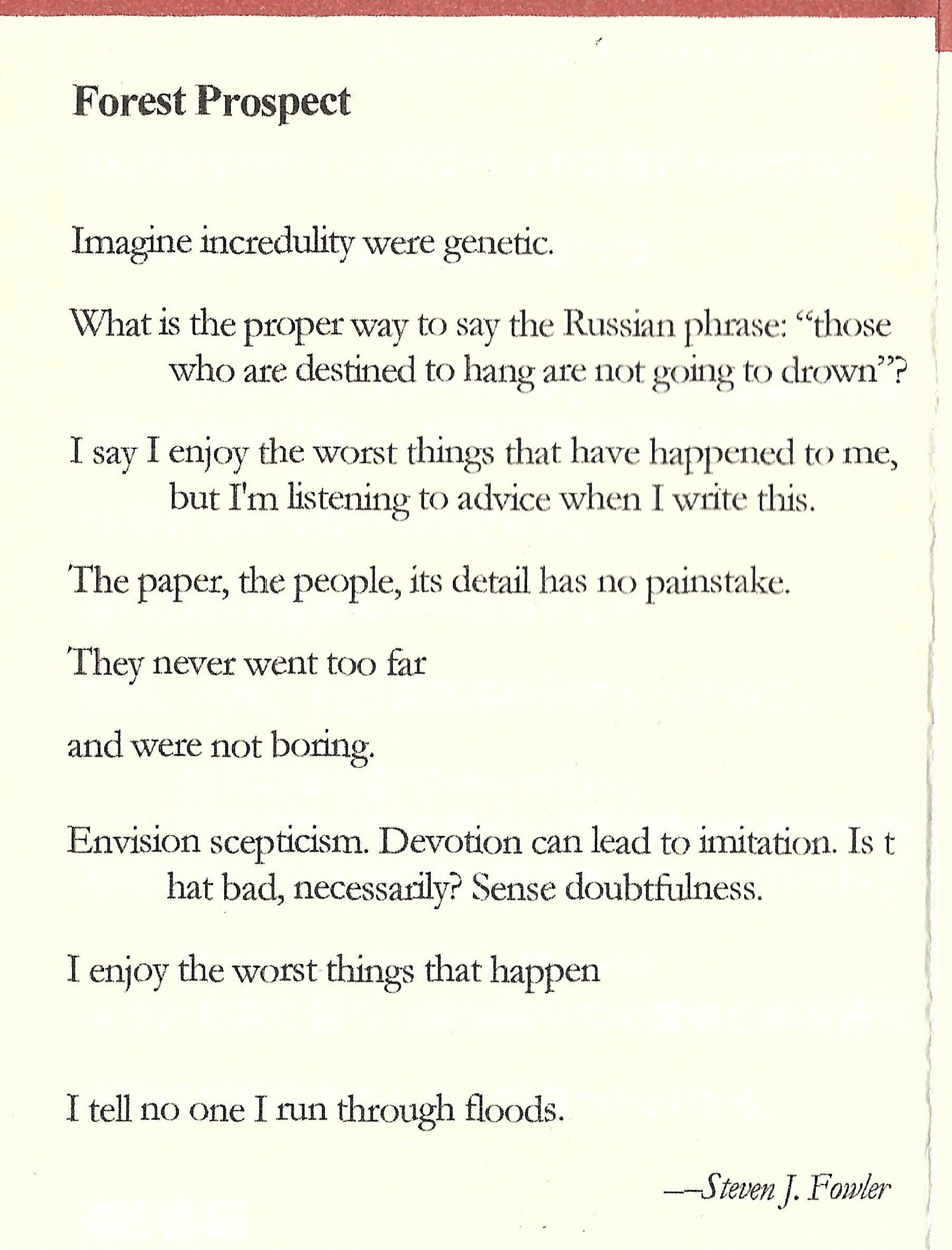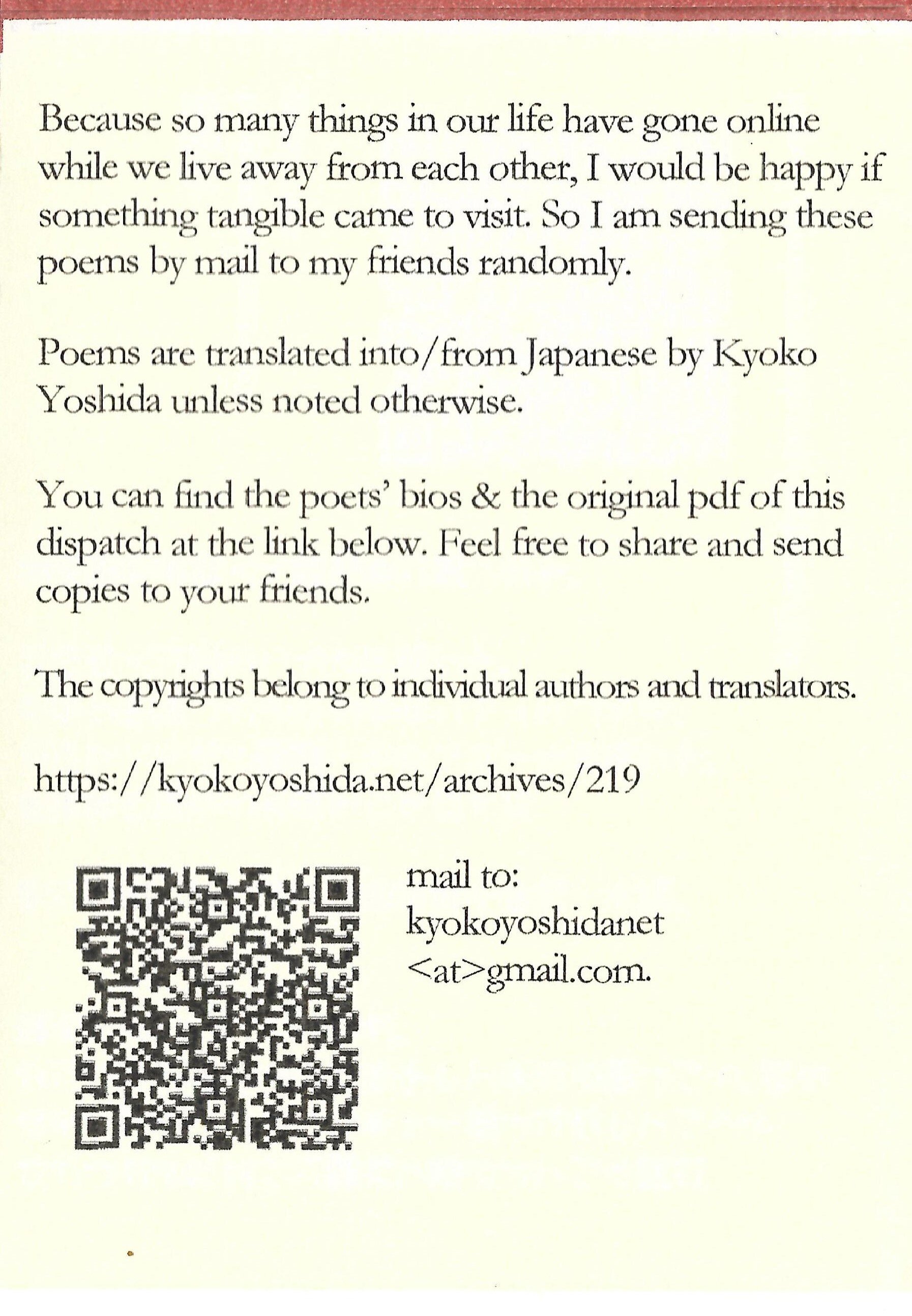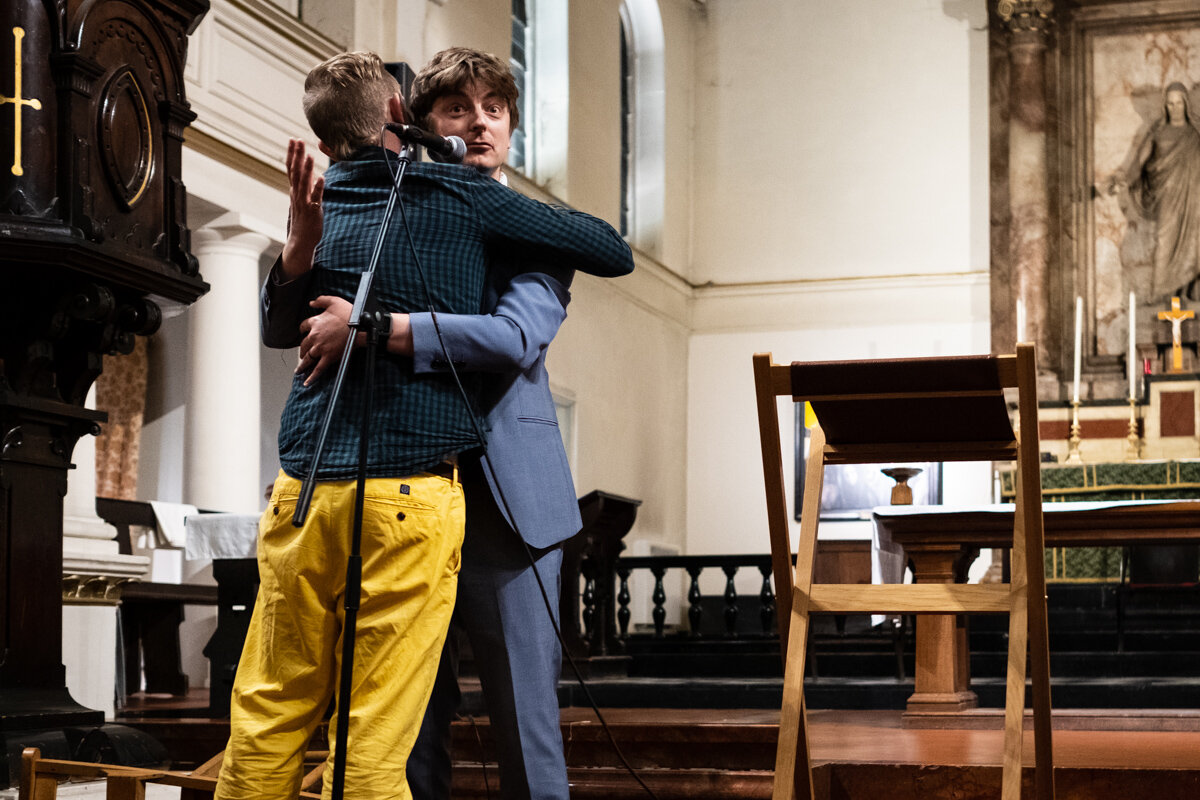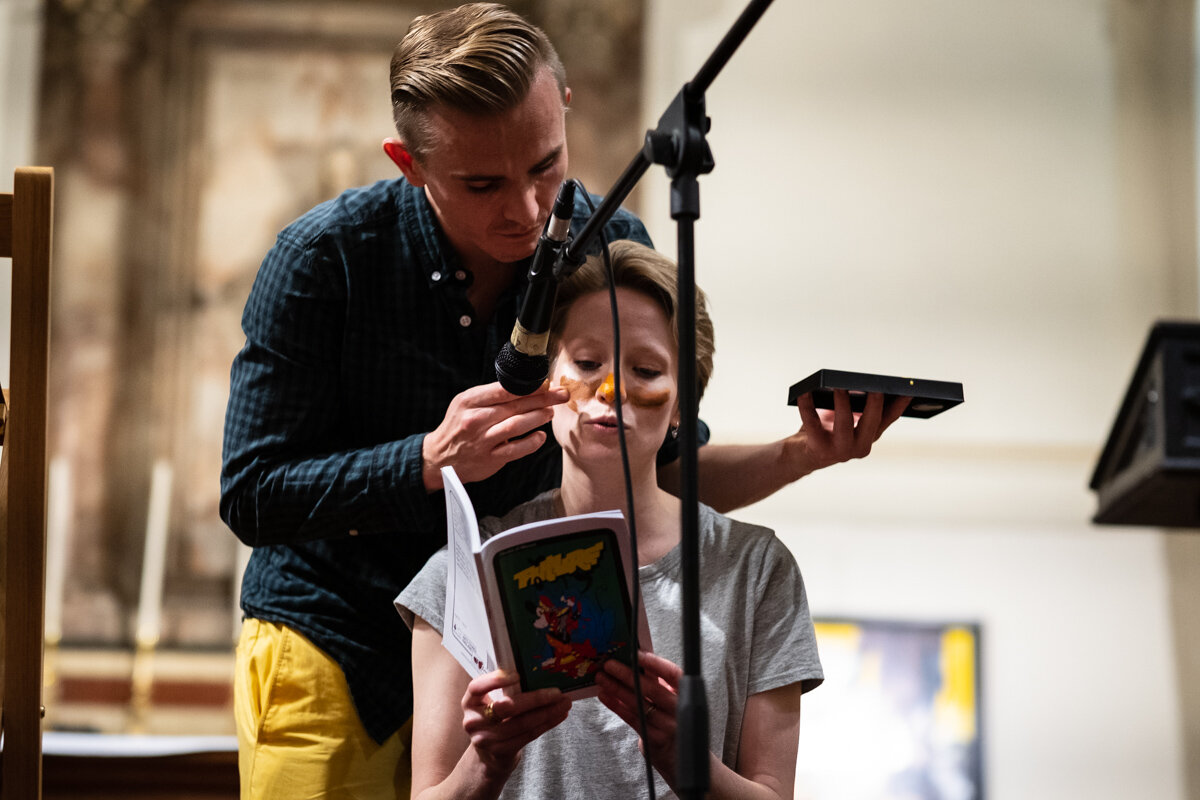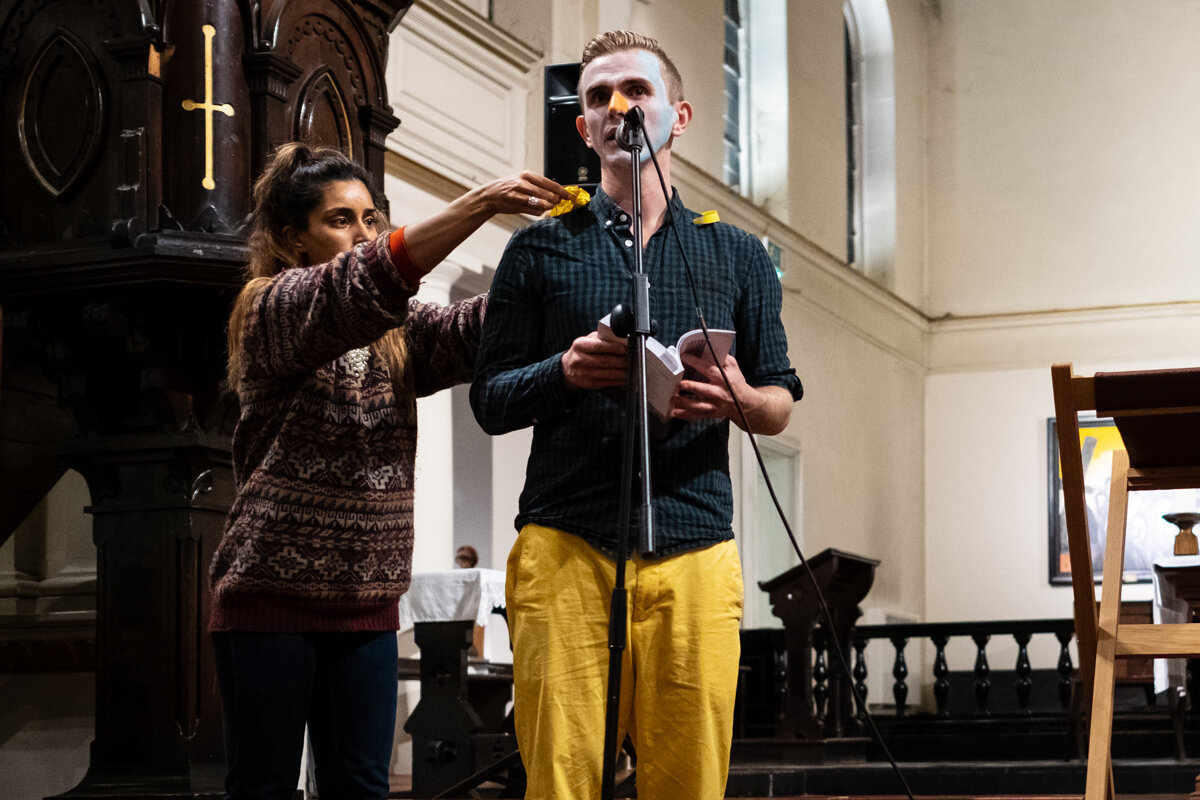A beautiful project by Kyoko Yoshida, a mailart poetry journal, an object of wonder because it can be pocketed, it is materially there in these pandemic times, and because it creates a unique dialogue between the poets involved, who range across Kyoko’s world, from Japan to Europe to the US and beyond. This issue I’m in features some lovely work and my friend john Mateer, which was a surprise. I wrote a new poem for it too. Vist http://kyokoyoshida.net/archives/219
Published : Nemeses essay on Haverthorn
Nemeses - my selected collaborations 2014-2019 - was produced really so brilliantly by Haverthorn press, and editor Andrew Wells. It was published beautifully in late 2019 and 8 months on, I couldn’t be happier with it. To keep a little fire burning on the volume, Haverthorn have published the essay I wrote for the rear of the book online as a pdf. Below is the beginning of the essay where I discuss the bind of writing of complex work and expecting it to be popular or well known, and why poetry might appear to be a singular art when it ain’t. Full essay can be read Nemeses+essay.pdf
The book is available https://www.haverthorn.com/books/nemeses-selected-collaborations-of-sj-fowler-volume-2
a nemetic poetics, or being happy alone in company
“One can have friends without wanting to see them.”
Charles Lamb
A problem shared is a problem doubled unless the problem is an essential and painful truth, that is awful, until it is inspiring, when experienced, in shared recognition, with other human animals. Can you achieve this anti-alienation of making things in writing poems? If you like.
Doing poetry can be proper lonely for reasons quite different than what many people seem to think. You hear people parrot on about the solitude of writing, as though the act itself were unusually isolated, or that the ways and means of creating or editing a poem require a removal of not just the body and the mind, but the soul. Everything that requires concentration is lonely. Everything worthwhile requires such attention. That’s how taste and skill is made.
The unusual monoculture of poetry is a stereotype responsible for quite a good deal of bad poetry. Poetry is less remote than fiction say, taking a comparison in the same field, for arguments sake. You don’t have to spend hours alone in your room on a computer to write a poem. No, poetry is lonely for me because of the very specific 21st century milieu. Poetry is out of these times, no matter what anyone says. It is a thing without market force, which allows it to create weird contextual manipulations of what quality is, and more importantly, it really really requires concentrated affirmative attention to be enjoyed as both writer and reader. No big deal, but we are in an era when everyone’s brain is morphed up by rapidity. This is not necessarily a bad thing. But it is bad for good poetry….
This is why a lot of (not all) ‘popular’ poetry is now resting upon a strong biographical context and why all the articles about poetry’s popularity mostly won’t mention with whom it is popular and what kind of poetry it is that’s popular. That’s not just because the journalists tend to not know there are types of poetry. Again, not necessarily a bad thing. It’s simply the world has changed around the poem and the poem can only change so much. It can only be so accessible when it is good. It cannot convince like the cinema, say, at its lowest common denominator.
All this means, fundamentally, and reasonably, no matter how much work you put into writing things that are not boring and predictable and sentimental, things that are concerned with language itself, and what has come before, and how unimaginably complex, mysterious and difficult existence and language is, and no matter how good you get at performing those things, in public, to audiences, virtually no one can care. That’s obvious though, isn’t it? Isn’t that a good thing overall? To know you are out of that kind of pursuit of success? Most of the time it is a blessing. Sometimes it makes you feel lonely. Hacking away at a seam somewhere remote, not wanting to make virtue of obscurity, not wanting to be swimming in language plastic with extreme artificiality either, and not wanting to court academic or tribal support systems of insulation and deluded bitterness, and yet, still being unable to swallow the anti-intellectual and sentimental thrust that dominates, without a common-sense quality control, the artform in your nation. You’re stuffed really, if you want something other than your own little trough. But again, what can one reasonably expect? To write difficult, strange, hermetic, coded, weird books and expect them to appeal to readers? Funny when I say it like that.
How could a poet from a Slavic country hope for anything more than a chamber audience confined to a few universities? We all entertain our illusions, but not when they overstep the bounds of reason.
Czesław Miłosz, Nobel Prize for literature
I’ve contradicted myself, and truly, I don’t want a lot of people to care, that’s inevitable with what I’m interested in and given the way people are, but this all provides a problem that must be solved. How does one create meaning, purpose, motivation, even joy, pleasure, excitement, working away at a medium that can feel repetitive and pointless (knowing it is supposed to)?……………………………. The essay continues, please read on Nemeses+essay.pdf
Writers' Centre Kingston : blog #2 - Sampson Low Poetry Publication series
I would say of all the initiatives I've lined up for my new role at Writers' Centre Kingston, this one, a series of new limited edition poetry pamphlets for current students or recent alumni of Kingston Uni, is the one I'm most excited about. It gives me the chance to work closely with some remarkably mature, original and exciting poets and its the first series I've edited like this, only seven years into my own writing. Molly, Zakia and Dacy have all made my time at kingston in the last few years more engrossing because of the constant surprises and reassurances their work has provided. https://www.writerscentrekingston.com/sampsonlow
The link has the place to buy the booklets, and anything that supports Alban Low's work at Sampson Low is worthwhile. His professionalism and attention to detail is remarkable too. Here's my statement accompanying the series
“Kingston University brings together students from all over the world, from as wide a range of backgrounds and cultures as can be found in the UK. It creates a community that cross pollinates influences and ideas, and this is inevitably reflected in the work the students create. The university does not get enough credit for this – it is, I have seen, a vibrant, harmonious environment where originality and difference can be transformed into exciting and innovative expression. The students are hungry for that which is innovative, that which allows them to express the true size and complexity of their experience and their community at the university. This series of poetry pamphlets reflects that. The work is utterly contemporary, it is exciting and energetic. It is, I hope, the best kind of representation of what Kingston University stands for – intelligent, unique and various in its character.”
Series editor, SJ Fowler
A note on: Shifting Ground with J&L Gibbons at Dalston Curve
30 Year Anniversary Event and launching Shifting Ground, a publication - September 22nd 2016: A really wonderful night at Dalston Curve with all the friends, colleagues and members of J&L Gibbons, celebrating three decades of remarkable, innovative, mindful work in shaping the environment of London and beyond. Lovely to work towards this night, where I gave a small contribution with this collective, multivocal reading, through the Shifting Ground publication. A beautiful object, it combines articles, reflections, dialogues, celebrates the past through future work and enterprise, and fortunately for me, contains a suite of my poems.
Published: The House of Mouse by Prudence Chamberlain & I - Knives Forks & Spoons press: July 2016
Available to buy: http://knivesforksandspoonspress.co.uk/houseofmouse.html
To be launched as part of The Poetry School Camarade on July 17th 2016 at Rich Mix &The CapLet 1st year anniversary reading on August 10th at St Margaret's House, both near Bethnal Green.
I'm always interested in collaborating as a form of learning, growing as a poet and a person through the intelligence and idiosyncrasies of my collaborator. This book, and my ongoing collaborative work with Prudence Chamberlain, is a great example of that. These poems are unique for me, drawing me into new ways of writing, and this is such a beautiful book, dotted with new artworks by a variety of visual artists. Hopefully the humour, the intensity and the style will show through to readers too.
From the publisher: "Discursive, playful, obscene and satirical, The House of Mouse is a collection of ten poetic collaborations written by British poets SJ Fowler and Prudence Chamberlain - each responding to a famed cartoon, each uncovering the bizarre overt and covert symbols and signs of these pervasive animations.
Dotted with original illustrations by contemporary artists like Lizzy Stewart and Duncan Marchbank, this unique collaborative collection aims to show that maybe the only thing stranger than corporate cartoon animals is avant-garde poetry."
One of the texts, Bambi, was published by the online poetry journal Country Music, edited by Scott Abels, in March 2016 is available to read below. http://countrymusicpoetry.org/index.php?pr=chamberlain-fowler
A note on: writing an introduction to Volodymyr Bilyk's Heartbeat, Footclick, Machine Gun Vocalises
A privilege to write the introduction to Volodymyr Bilyk's new work out with the brilliant M58 press edited by Jez Noond and Andrew Taylor, based in the UK. It's a hugely important work of avant-garde visual poetry emanating from real purpose and I've scanned (wonkily) my introduction in below. You can buy it here for £5 and I urge you to do so. http://www.m58.co.uk/post/141316776709/heartbeat-footclick-machine-gun-vocalises-by
Published: Tractography by Pyramid Editions
An incredible job done by Owen Vince and the team at Pyramid Editions, Tractography is a beautiful, fragile piece of work. Printed in a run of just 50 copies, it contains the first in my new series of poems that centre upon neuroscience and neuroscientific ideas, this time inspired by the work of my friend Daniel Margulies. My sincere thanks to Owen and Daniel, and you can pick up one of the few remaining editions here http://pyramideditions.co.uk/shop
Gelynion: a publication by Hazard Press
Thanks to the remarkable skill and generosity of Jeremy Dixon, Gelynion was accompanied by a beautiful, handmade publication. A six way collaborative poem, where each of the core touring six poets - Nia Davies, Zoë Skoulding, Eurig Salisbury, Joe Dunthorne, SJ Fowler & Rhys Trimble - each wrote a line, and then, with names removed, each other poet added a line, wherever they wished on the page until six poems of six lines had been written. Each poem a truly collaborative work.
Jeremy, who makes such wonderful literary objects at http://hazardpress.co.uk/ then handcrafted just 60 copies for a limited edtion run. He had them waiting for us at the very first gig in Newport and they proved to be a great success throughout the tour. It's hard to convey their delicate and unique character, small and elaborately finished. A huge thanks to Jeremy, do visit Hazard Press and peruse their wares.
The poems within were read twice on the tour, including being the very last reading at the last Welsh gig, at the Hay Festival, where each of us six stood to read a poem each. https://www.youtube.com/watch?v=sb40wuSWBxo
Below Ground: a book with J&L Gibbons selected for On Landscape project at Materia Gallery
So pleased to be associated with the amazing landscape architects J&L Gibbons and to be a part of their beautifully produced Below Ground publication was a lovely thing, with my poems on Soil.
Now to find out that work has been selected for the On Landscape exhibition at the Materia gallery, is a grand and unexpected development. http://www.materiagallery.com/
"Matèria is proud to announce the results of the On Landscape #2 book call. On behalf of the judging panel we would like to thank all the participants; the response and quality of submitted work has been exceptional. After careful deliberation the judges selected 44 books that will be exhibited at Matèria alongside work by Dafna Talmor, Emma Wieslander, Minna Kantonen and Marco Strappato."
Open Mouth Surgery, a collaboration with Morten Sondergaard, published in the Bohemyth
Launching "Vikings: the Whale Hunt" a new publication with Annexe
Gorse magazine introduces me

“For years I was completely isolated in my reading too…and as such I was in a bubble, didn’t have the chance to develop any sense of prejudice against poetry in translation, or avant garde work, as somehow otherly. That’s perhaps why I read this kind of work alongside poetry that might be better known in this country in equal measure.”
‘I think there’s a territorial, self-defeating dualism that seems to permeate through people’s perception of the experimental, that it requires a philosophical or political praxis to be part of their writing. That it is against something, more than it is for something. This isn’t true, fundamentally. Experimentation is about finding the authentic way to express a very certain content.’
the gypsy wound
fighting man of a fighting family
bitterly pain full is a broken jaw, a bruised
kidney
it’ll make you think twice, modern Paul
it doesn’t just hurt, it’s worse
it drifts its bookish suitcase
like a river of shirt toward work
